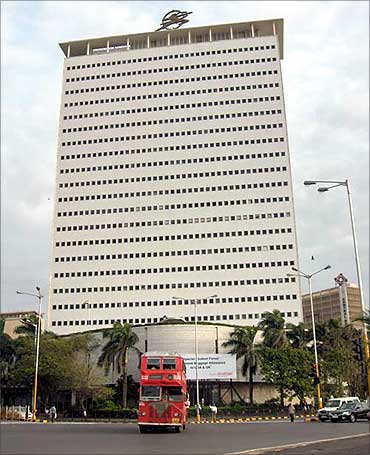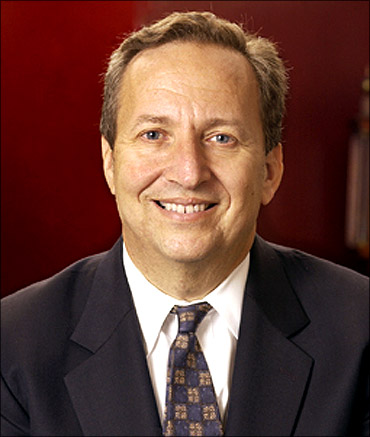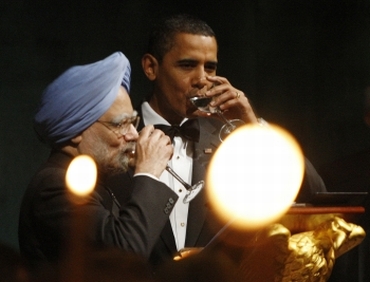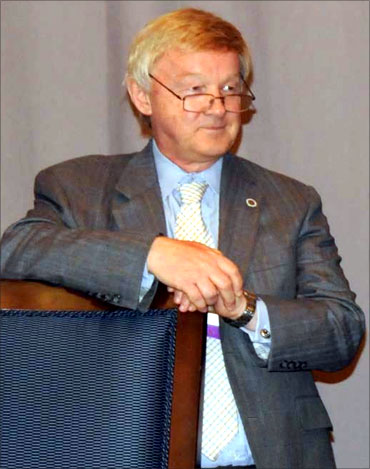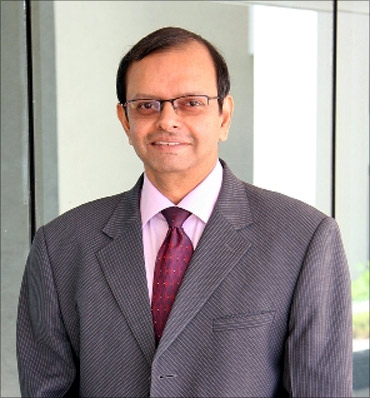 | « Back to article | Print this article |
Rise of India, China, the next big story: US
The next big story after the Industrial Revolution is going to be the rising clout of India and China in the global arena, according to Lawrence Summers, Director of the White House National Economic Council.
Delivering the key-note address at the 2-day fourth World BPO-ITO Forum conclave at Jersey City, he said the world dynamics had changed drastically in the past 30 years. He said at least during the Industrial Revolution one could perceive a substantial change in a lifetime.Click NEXT to read on
Rise of India, China, the next big story: US
This is unprecedented economic progress on a scale never seen before that brings staggering potential and opportunities, Summers said at the conclave themed "Flattening the world: the economic, political and technical impact on global economy".
Taking a lesson from history, it does come with its own share of challenges and consequences, he said, extending a note of caution.
Click NEXT to read on
Rise of India, China, the next big story: US
Focusing on outsourcing which is dependent on the location of skills around the world, Summers said, "Conservative estimates of it being a threat to our progress is a prescription for a more contentious and less prosperous world."
During the Industrial Revolution there were critics that prophesised that machines would mean fewer jobs but they were proved wrong in the long run, he said.
To seek to "wall off" the prospect of off shoring is to deny the US business houses the right to participate in the ongoing economic revolution, he added.
Click NEXT to read on
Rise of India, China, the next big story: US
He proposed this through accountability and encouraging innovation through research. Summers said that US has a huge stake in scientific enterprise to innovate cutting edge technology as it has done in the past by being incubators of Google, Facebook, IBM, Apple and Amazon to name a few.
But, he said the challenge of politics at international level was setting checks and balances without regulating the economic progress. Summers expressed his belief on the resilience of the American economy.
Click NEXT to read on
Rise of India, China, the next big story: US
During the question-answer session, Summers fielded a volley of questions ranging from the framing of debate between India and China, the debt problem and its resolution without some sacrifice by the US public, tax-systems and overall policy matters of the government.
Answering all of these with aplomb, he said that governing and democracy is not an easy task and that each problem would be addressed to reach optimal solutions for the greater good.
Click NEXT to read on
Rise of India, China, the next big story: US
During the last four years, World BPO-ITO Forum has come to be recognised as the Davos of Outsourcing and has brought together path-breaking executives, academics, providers and visionaries from around the globe.
Babu Lal Jain, Advisor to the United Nations Office of Partnership in New York and co-founder of World BPO-ITO Forum, in his welcome address said the conclave attracted participants from India, the Philippines, Brazil, Malaysia, Argentina, Poland and Hungary and this demonstrated how the industry has taken globalisation to next level.
Rise of India, China, the next big story: US
Ganesh Natarajan, Nasscom chairman's council member and vice chairman and CEO of Zensar Technologies, chaired a plenary session on "New Horizons for offshore outsourcing."
Surya Kant, President, Tata Consultancy Services (TCS) and Sushma Rajagopalan, Head, Global strategy and Business Processing Services of L and T Infotech and Parvind Dutta, Business Development Manager of L and T Infotech in Edison, NJ, also spoke.
Click NEXT to read on
Rise of India, China, the next big story: US
Soumithra Rathod, Vice President of World Wide IT Sourcing for McGraw Hill Publications, gave his overview of the industry.
John M Lutz, General Manager, Global Processing Services of IBM and Calestous Juma, Professor of John F Kennedy School of Government of Harvard University, were among the top notch leaders who showered praise on India's growth trajectory.
